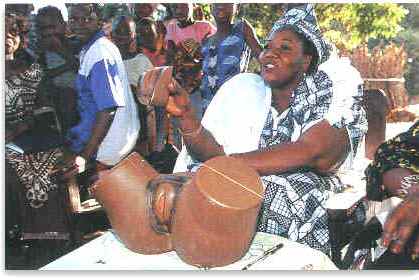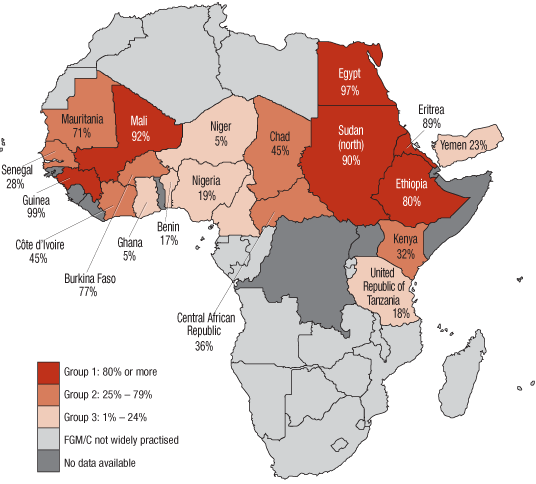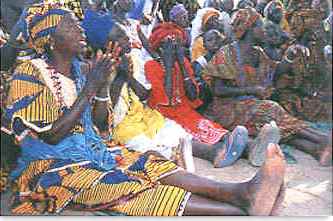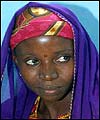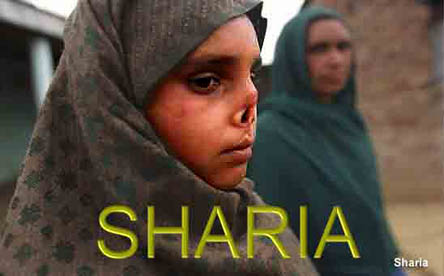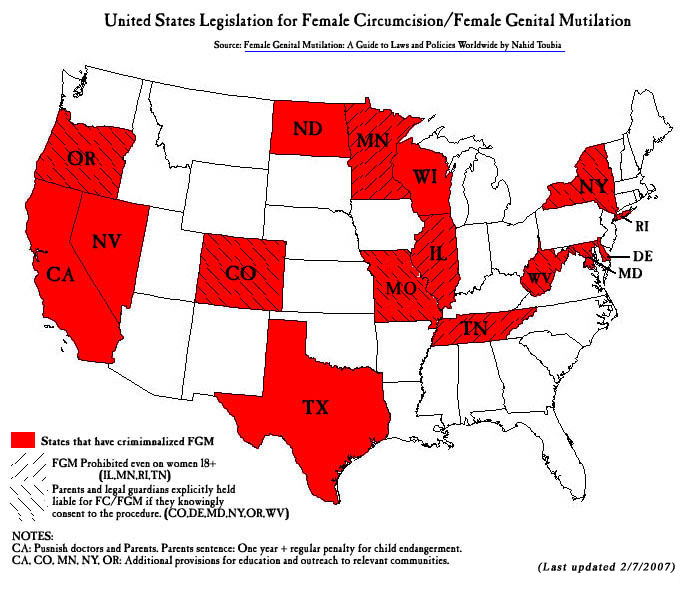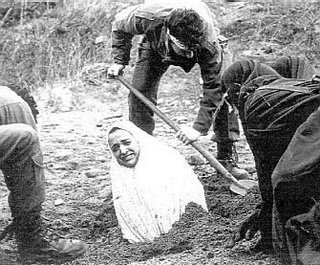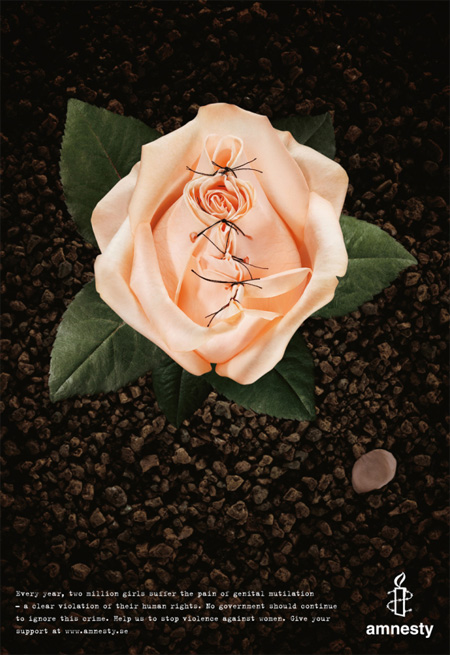|
BACK "IF I RESPECTED YOUR BELIEFS I WOULD HAVE THEM" |
|
Links: Islam Code of Hammurabi | Islam vs. Mormonism | John and Mary Pay a Visit | Does the Koran incite violence? |
|
|
|
|
| Female Genital Mutilation (FGM) is practiced in Africa's Islamic countries... | |
| Women in resistance - Educating the people | |
|
The resistance and education among African people is an ongoing process that will surely still take a lot more time and energy until its success. The view on this cruel patriarchal tradition needs to be changed, and more and more women are focusing on the ongoing struggle. |
|
|
|
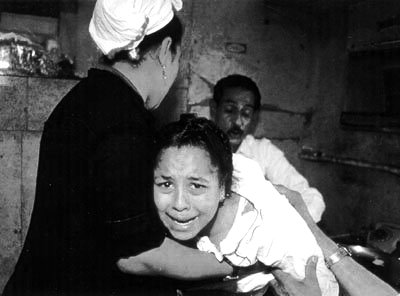 |
|
British girls undergo horror of genital mutilation despite tough laws By T R A C Y M C V E I G H A N D T A R A S U T T O N Female circumcision will be inflicted on up to 2,000 British schoolgirls during the summer holidays – leaving brutal physical and emotional scars. Yet there have been no prosecutions against the practice Like any 12-year-old, Jamelia was excited at the prospect of a plane journey and a long summer holiday in the sun. An avid reader, she had filled her suitcases with books and was reading Harry Potter and the Prisoner of Azkaban when her mother came for her. "She said, 'You know it's going to be today?' I didn't know exactly what it would entail but I knew something was going to be cut. I was made to believe it was genuinely part of our religion." She went on: "I came to the living room and there were loads of women. I later found out it was to hold me down, they bring lots of women to hold the girl down. I thought I was going to be brave so I didn't really need that. I just lay down and I remember looking at the ceiling and staring at the fan. "I don't remember screaming, I remember the ridiculous amount of pain, I remember the blood everywhere, one of the maids, I actually saw her pick up the bit of flesh that they cut away 'cause she was mopping up the blood. There was blood everywhere." Some 500 to 2,000 British schoolgirls will be genitally mutilated over the summer holidays. Some will be taken abroad, others will be "cut" or circumcised and sewn closed here in the UK by women already living here or who are flown in and brought to "cutting parties" for a few girls at a time in a cost-saving exercise. Then the girls will return to their schools and try to get on with their lives, scarred mentally and physically by female genital mutilation (FGM), a practice that serves as a social and cultural bonding exercise and, among those who are stitched up, to ensure that chastity can be proved to a future husband. Even girls who suffer less extreme forms of FGM are unlikely to be promiscuous. One study among Egyptian women found 50% of women who had undergone FGM "endured" rather than enjoyed sex. Cleanliness, neatness of appearance and the increased sexual pleasure for the man are all motivations for the practice. But the desire to conform to tradition is the most powerful motive. The rite of passage, condemned by many Islamic scholars, predates both the Koran and the Bible and possibly even Judaism, appearing in the 2nd century BC. Although unable to give consent, many girls are compliant when they have the procedure carried out, believing they will be outcasts if they are not cut. The mothers believe they are doing the best for their daughters. Few have any idea of the lifetime of hurt it can involve or the medical implications. Jamelia, now 20, who says her whole personality changed afterwards." I felt a lot older. It was odd because nobody says this is a secret, keep your mouth shut but that's the message you get loud and clear." She stopped the sports and swimming she used to love and became "strangely disconnected with her own body". Other girls have died, of shock or blood loss; some have picked up infections from dirty tools. Jamelia's mother paid extra for the woman to use a clean razor. It is thought that in the UK there are one or two doctors who can be bribed by the very rich to to carry out FGM using anesthetic and sterilized instruments. Comfort Momoh works at Guy's and St Thomas' Hospital in London, in one of the 16 clinics up and down the country who deal with FGM and its health repercussions. Women who have had much of their external genitalia sliced off and their vaginas stitched closed, but for a tiny hole, also come to be cut open in order to give birth. There are four types of female circumcision identified by the World Health Organization, ranging from partial to total removal of the external female genitalia. Some 140 million women worldwide have been subjected to FGM and an estimated further two million are at risk every year. Most live in 28 African countries while others are in Yemen, Kurdistan, the US, Saudi Arabia, Australia and Canada. The UK Prohibition of Female Circumcision Act 1985 makes it an offence to carry out FGM or to aid, abet or procure the service of another person. The Female Genital Mutilation Act 2003, makes it against the law for FGM to be performed anywhere in the world on UK permanent residents of any age and carries a maximum sentence of 14 years imprisonment. To date, no prosecutions have been made under UK legislation. "Obviously in summer we get really anxious. All activists and professionals working around FGM get anxious because this is the time that families take their children back home. This is the time when all the professionals need to be really alert," said Momoh. "There is no hard evidence in figures about what is happening in the UK because it's a hush-hush thing. It's only now that a few people are beginning to talk about it, which is good because change will only come from within and the numbers coming forward are rising. But there is a lot of family pressure. When I first started in 1997 we had two clinics in the country, now we have 16." One woman told the Observer how a midwife examining her had raced retching and crying from the room. She had no idea she was "abnormal" before that happened. There is a clear need for women who have suffered FGM to be able to visit health professionals who understand what has happened to them. Momoh said that for those who wanted it, some surgical reversal work could sometimes be done on women with the most severe FGM procedure, Type III. For those with other types, counseling and support is all that can offered. "Periods are agony – you get a lot of women who are determined to have reversals while they are having their period but then when the pain has stopped they lose their nerve again," said Leyla Hussein, 29, who has had to have years of counselling to cope with her own anger and distress at what was done to her as a child. It has helped her forgive her own mother's complicity in the mutilation she endured, though the older woman could not understand why Hussein would not have her own child, now aged seven, cut. But Hussein has vowed that she will be the last generation of women in her family to suffer. "It was my husband who said on our honeymoon, 'We are not going to do this thing to any child of ours.' I was quite shocked, I hadn't questioned it. But I now realize a lot of men are not in favor of FGM, not when you tell them the woman is not going to enjoy herself." Hussein is among a slowly but steadily growing band of women who have reacted against what happened to them with courage and a determination to stamp out FGM. Hussein has run support and discussion groups for affected women and for men, and formerly worked at the African Well Women's Centre in Leyton, east London. "I can really relate to some of the women who are very angry, but how do you blame your mother, who loves you yet planned this for you? There is a lot of anger and resentment. Many women blame themselves and of course there are flashbacks to deal with. I had blackouts – anytime I had to have a smear test, I would pass out because lying in that position brought it back to me, but the nurse is used to me now and allows a little more time with the appointment." "The new generation, born and raised here in Britain, they are used to expressing their views and it will be a lot harder to shut them up. Last month was the first ever march against FGM [in Bristol where 15 to 16 mothers protested] and that is a sign of something new." Asha-Kin Duale is a community partnership adviser in Camden, London. She talks to schools and to families about safeguarding children. "Culture has positive and negative issues for every immigrant community. We value some traditions, and most are largely good. "FGM is not confined to African countries. It has no basis in Christianity, it has no basis in Islam; none of Muhammad's daughters had it done. For some parents it is enough to let them know that and they will drop it completely. Everyone needs to understand that every child, no matter what the background or creed, is protected by this law in this land." She said there needed to be an understanding of why FGM took place, although that was not the same as accepting that the practice had a cultural justification. "FGM has a social function and until this is understood by social services and other bodies they will never stop it. It is a power negotiation mechanism, that women use to ensure respect from men. It prevents rape of daughters and is a social tool to allow women to regain some power in patriarchal societies. With girls living in the UK there is no need to gain the power – it has to be understood that girls can be good girls without FGM." For Jason Morgan, a detective constable in the Met's FGM unit, Project Azure, the solution lies with those girls themselves: "Empowering youth, giving them the information, is the way forward. They are coming from predominantly caring and loving families, who genuinely believe this is the right thing to do. Many are under a great deal of pressure from the extended families. "Sometimes it might be as simple as delivering the message of what the legal position is; sometimes we even give them an official letter, a document that they can show to the extended family that states quite firmly what will happen if the procedure goes ahead. The focus has to be on prevention." Project Azure made 38 interventions in 2008, 59 in 2009 and 25 so far this year. For Morgan those statistics are just as important as getting a conviction. "We know it happens here although we have no official statistics, but we have seen very successful partnerships and we don't want to alienate communities through heavy-handed tactics. "While a prosecution would send out a very clear message to practicing communities, really it is very difficult and you would be relying on medical evidence, and in turn that would all hinge or whether the child consents to an examination." But Naana Otoo-Oyortey is not so content with the softly-softly approach: "We have anecdotal evidence that it is being done here. So someone is not doing their job: it's an indication that the government has been failing to protect children. The commitment is hollow." Head of the leading anti-FGM charity Forward UK, Otoo-Oyortey said people value the FGM tradition as something which holds a community together and gives it structure. "It's seen as a party, a cutting party because it's a celebration – people expect it as a way of welcoming a girl. A lot of women will mention to us that there have been no prosecutions here so why do we worry about the law? At the end of the day who will know? "And we cannot just blame the women as the men are silently supporting it by paying for it. The new government's lack of a position on FGM is very worrying. We don't know what they will do, but we do know that the summer holidays are here again and we will be left to pick up the pieces in a few weeks' time." And for those who will be "cut" this summer, the effects will be lifelong. Miriam was six when she had her cutting party at her home in Somalia, two years before war arrived to force her family out. When she was 12, doctors were horrified to find that what they thought was a cyst in her body was actually several years of period blood that had been blocked from leaving her body. Unable to have children, she now lives and works in England and worries about other girls. "I'd seen so many people circumcised, all my neighbours, so I knew one day it was going to happen to me. We knew what was happening," Miriam said. "The little girls who were born in Europe have no clue. They will be traumatised a lot more. The only thing they know is that they are going away – that's what they say, 'We're going on a holiday'. "Then her life and her head are going to be messed up. It's amazing how many people are in mental health care because of their culture. Don't get me wrong, I have religion and culture and I love where I'm from and I love what I stand for. But culture should not be about torture. "Why would anyone want to go and cut up a seven- or eight-year-old child? People need to wake up — you are hurting your child, you are hurting your daughter, you're not going to have a grandchild, so wake up." Source: theguardian.com |
|
|
Burkina Faso government block clitoral repair hospital opening Tue, Mar 4th, 2014 According to a statement released today by the nonprofit organization Clitoraid, pressure from the Catholic Church and other detractors of the International Raelian Movement (IRM) has caused Burkina Faso’s government to block the scheduled March 7 opening of Clitoraid’s clitoral repair hospital, known as the Kamkaso Hospital, in Bobo-Dioulasso, Burkina Faso. Nicknamed “the Pleasure Hospital”, the Kamkaso facility is the first of its kind in the world. “Although the government has suddenly withdrawn its approval for surgeries to be performed there, this facility, once open, will provide free surgery for victims of female genital mutilation,” said Dr. Brigitte Boisselier, president of Clitoraid and spokesperson for the IRM. “The procedure repairs the physical damage they endured. But this wonderful mission has now been stymied by the Catholic Church and its cronies, who are conducting a smear campaign against it for their own selfish motives.” Boisselier said Clitoraid will seek immediate legal redress through the courts. “In the meantime, the surgeries we had scheduled will still take place over the next few weeks, at another hospital in Bobo-Dioulasso,” she said. “We’re going ahead as planned.” She went on to describe why the Kamkaso Hospital will not open on March 7. “Although the request for licensure of the new hospital was submitted in 2011 and we received repeated assurances from regional and national officials that the hospital could open on March 7, the health minister of Burkina Faso has explained to a representative of AVFE, our local Clitoraid partner, that the license will not be approved for our scheduled inauguration date of March 7,” Boisselier explained. “Nevertheless, we will go ahead with our inauguration ceremony as planned. And our surgical team will still operate on the patients scheduled for the procedure, but that will take place at another hospital.” She said that an official source who requested anonymity told her that strong pressure from IRM detractors, especially the Catholic Church, was responsible for both the license refusal and the cancellation of the First Lady of Burkina Faso’s participation in the opening ceremony. “By seeking to prevent our opening, the Catholic Church has become an accomplice of the criminals who mutilate the genitals of African women,” Boisselier declared. “Along with its mission of restoring mutilated clitorises for FGM victims, Clitoraid’s Pleasure Hospital will be a strong deterrent to those who still practice this barbaric custom. They would stop making the excisions since it’s foolish to destroy something that can be readily restored.” Boisselier said this stance taken by the Catholic Church against Clitoraid is hardly a surprise, given the Vatican’s record. “Those blocking our opening are the same criminals who support pedophile priests and money laundering by Vatican banks,” she said. “And their directives against using condoms are responsible for thousands of unnecessary AIDS deaths in Africa.” Boisselier said Clitoraid will take prompt legal action to open the hospital. “This pressure to close us down will only delay the opening,” she said. “Our attorneys are already looking into various legal options and there will also be worldwide protests in front of Burkina Faso’s embassies.” As evidence of the pressures brought by the Catholic Church, Boisselier cited the following declaration made against the Kamkaso Hospital by Professor R. Marie Charlemagne Ouedraogo, a Knight of the French Legion of Honor and Commander of the Sovereign Military Order of Malta, a well-known branch of the Catholic Church. “This is a big campaign of fraud organized by the sect of Rael with the complicity of certain doctors of Burkina Faso! The health ministry and the governor are beseeched to stop this poisonous campaign! Also, the complicit doctors will have to appear before the medical board very soon!” “How can a doctor who performs these surgeries himself at very high cost to his patients accuse us of a fraudulent campaign when his rates are way too high for the poor women who planned to come to the Kamkaso hospital?” Boisselier asked. “What is the real fraud here? Clitoraid offers free surgeries performed by competent volunteer doctors, and they follow a procedure that has been published officially by its originator, Dr. Pierre Foldes of France. It has already been performed on thousands of women.” Boisselier went on to elaborate about what she considers the real reason for the smear campaign against Clitoraid and the Kamkaso hospital. “The real reason for this delay in the hospital opening is clearly linked to the fact that this purely humanitarian project was initiated by Rael, spiritual leader of the Raelian Movement,” she said. “The people putting pressure against this hospital prefer to pursue a pseudo-philosophical vendetta for their own profit instead of thinking of the 80 women who will be in Bobo-Dioulasso to have their free surgery between March 3 and March 14.” According to Boisselier, the surgeries will be done at the hospital of a doctor friend who will host Clitoraid’s medical team. “Our surgeons are licensed to perform surgeries in Burkina Faso,” she pointed out. “The people responsible for these pressures against us should be ashamed. The Kamkaso hospital is the collective effort of thousands of people of various philosophical backgrounds. They have all contributed to restore the pleasure of life to thousands of women who experienced deep trauma. To prevent them from receiving this voluntary and free help simply because the people offering it don’t believe in their god is outrageous. But this campaign against us is perfectly aligned with other misdeeds of the Catholic Church, which teaches that suffering is a source of awakening and ultimate spirituality.” Boisselier explained that for Raelians, pleasure is the most beautiful source of fulfillment. “We will continue doing our best to help FGM victims get their dignity back as women and enjoy their right to enjoy physical pleasure and fulfillment,” she said. The building inauguration ceremony will be held at Clitoraid’s Kamkaso Hospital on March 7 starting at 10 a.m. A press conference will follow. Distributed by APO (African Press Organization) on behalf of Clitoraid. |
|
| What has been done to stop FGM?
The UN's health agencies have worked for years on FGM as a health hazard to women and girls. Research evidence shows grave permanent damage to the health of girls and women. Acute complications involve hemorrhage infections, bleeding of adjacent organs, violent pain. Life long complications include scarring, chronic infection, urologic and obstetric diseases, serious complications during childbirth, pain at intercourse and chronic depression. The international community has recognized FGM as a human rights violation and a form of violence against women. African women have been working for many years in grassroots communities and with their governments to educate women and men about the harm caused to girls and women by FGM. A number of governments have outlawed FGM, but the practice continues. In many of these societies, women's subordinate status renders them economically and socially dependent on their husbands and fathers, making it very difficult to avoid undergoing the operation. Efforts to eradicate the practice must also include ending pervasive discrimination against girls and women in these societies.
Education about the harmful effects of FGM and its illegality is provided to African immigrants in Australia, Canada, France, Holland, Norway, Sweden, the United Kingdom, and the United States. United Nations agencies (UNICEF, UNFPA, and WHO) issued a joint position paper and are increasing their efforts to eradicate FGM. WHO recently launched a 15-year strategy to accelerate these efforts. The United States Agency for International Development (USAID), recently reviewed its FGM programming and increased its support for FGM eradication programs by working with technical agencies such as PATH, RAINBE, International Center for Research on Women, CEDPA, The Focus Project, and the Population Council. |
|
|
|
|
|
The existence of her child was all the
evidence the judge needed.
"We uphold your |
An Islamic appeal court has upheld a
sentence of death by stoning for adultery against a Nigerian woman. Amina Lawal, 30, was found guilty by a court in Katsina state, Nigeria, after bearing a child outside of marriage. (BBC Aug. 19. 2002) Link |
| In her defense, lawyers used the notion of "extended pregnancy", arguing that under Sharia law, a five year interval is possible between human conception and birth (sic). | |
|
Link: Sharia Law... |
|
|
Combating genital mutilation in Sudan The lights are dim and the voices quiet. Tension fills the room where Nafisa, a six-year-old Sudanese girl lies on a bed in the corner. Her aunt, 25-year-old Zeinab, watches protectively as her niece undergoes the procedure now known as female genital mutilation (FGM), formerly called female circumcision. In this procedure, performed without anaesthesia, a girl's external sexual organs are partially or totally cut away. Zeinab does not approve. For the past year she has been trying to persuade her mother and sister to spare Nafisa from the procedure. She lost the battle with her family, but she will stay at her niece's side. She watches Nafisa lying quietly, brave and confused, and remembers her own experience. Zeinab underwent the procedure twice. At six years old she had the more moderate form of FGM, called Sunni, in which the covering of the clitoris is removed. When she was 15 the older women of her family insisted she have the Pharaonic form, which involves removal of the entire clitoris and the labia and stitching together of the vulva, leaving just a small hole for elimination of urine and menstrual blood. Zeinab still remembers the pain, the face of the women performing the procedure, the sound of her flesh being cut. She also remembers bleeding and being sick for weeks. This extreme form of FGM has been performed on 82 per cent of Sudanese women, according to a recent survey. Today, 85 to 114 million girls and women in more than 30 countries have been subjected to FGM. Female genital mutilation has long been performed to ensure chaste or monogamous behaviour by suppressing female sexuality.
FGM is dangerous. It is estimated that untrained traditional birth attendants perform two thirds of the procedures. They typically have limited knowledge of health and hygiene and often use inadequately cleaned traditional instruments. Side effects of FGM include trauma, bleeding and haemorrhage; pain, stress and shock; infections (which can be fatal); painful and difficult sexual relations; obstructed labour and difficult childbirth; and psychological trauma. The effects can last a lifetime. The practice was declared illegal in the Sudan in 1941, but that did little to stop it. About 90 per cent of northern Sudanese women have had it done. Why does FGM continue? In surveys, the most common reason given is fear of social criticism. Although women in the 16- to 30-year-old age group are receptive to the notion of eradicating FGM, older women are resistant. Many fear that an uncircumcised daughter will be a social outcast whom no man will marry. But efforts to stop the procedure are beginning. Dr. Amna Abdel Rahman, coordinator of the Sudan National Committee on Harmful Traditional Practices (SNCTP), has been working to eliminate it. "It has nothing to do with religion, and it damages women's health and socio-economic life," she says, calling on women to fight to stop FGM. She has gained government support, and eradication of FGM is now part of the National Plan of Action for the Survival, Protection and Development of Sudanese Children. An initial three-year education effort focuses on Central State, where the Pharaonic from is widespread. With funds from the Government of the Netherlands, Swedish Radda Barnen and UNICEF, the SNCTP is targeting community leaders, health workers and women's and youth organizations in a comprehensive awareness-raising effort. Dr. Rahman hopes to eradicate FGM by the year 2000. It is too late for Zeinab and Nafisa. But teaching them the importance of eradicating FGM may spare their daughters from this harmful tradition. - S a r a M a n s a v a g e is a freelance writer formerly based in Khartoum.
African women speaking out For example W a r i s D i r i e, author of 'Desert Flower' 'Desert Flower is the compelling autobiography of supermodel Waris Dirie, born into a traditional Somali family of nomads who believed in such archaic customs as female genital mutilation and arranged marriages between prepubescent girls and elderly men, for a dowry of a few goats and camels. The young Waris survived exploitation, attempted rape, and casual violence as she tenaciously fought her way as far as London, where she took a job as a maid for a distant uncle. There, as she struggled to learn to read and write, her striking beauty caught the eye of a photographer, and soon she had launched a modeling career that would take her all the way to New York City and international celebrity. Today, as a special ambassador appointed by the United Nations, she travels the world speaking out against female genital mutilation, promoting the cause of women's rights, and educating people about the war-torn, drought-parched region of Africa she fled - but still loves deeply.' Source: The Publisher |
|
|
Women America -
|
|
|
|
|
|
IRAN: Stoning for Adultery
Amnesty International: |
|
 Sources and Links: Wikipedia: Female genital mutilation (FGM) You Tube: Female genital mutilation Female suicide bomber Islam & masturbation IRAN: Stoning for Adultery Nigerian scams |
|
|
|
|
|
Please help eradicate Intolerance! |
|

